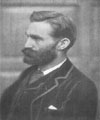 In 1881, Frank Podmore, who had joined the early Sidgwick group, met Edward Pease at one of the Spiritualist seances that were the vogue in London, at which time they became close friends. The next year he invited Pease to attend a meeting of this group in which the Society for Psychical Research (SPR) was formed. Norman and Jeanne MacKenzie relate this epic event in their history of The Fabians:
In 1881, Frank Podmore, who had joined the early Sidgwick group, met Edward Pease at one of the Spiritualist seances that were the vogue in London, at which time they became close friends. The next year he invited Pease to attend a meeting of this group in which the Society for Psychical Research (SPR) was formed. Norman and Jeanne MacKenzie relate this epic event in their history of The Fabians:
In this same period a group of young dons from Trinity College, Cambridge, were also turning to psychic research as a substitute for their lost Evangelical faith. In February 1882, Podmore took Pease to a meeting at which this group founded the Society for Psychical Research . . . Among those who founded the SPR were Henry Sidgwick, Arthur Balfour – later a conservative Prime Minister – and his brother, Gerald.
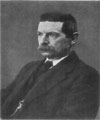
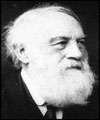 Edward Pease spent one year in the SPR as secretary of its haunted-houses committee, but then turned to politics with the conviction that a social revolution was necessary. For a time he worked with an associate of Karl Marx, Henry Hyndman, who founded the radical Social Democratic Federation. However, Pease was of the opinion that social revolution must begin with educating the intellectual and wealthy classes rather than fomenting agitation among the working class. He organized a Progressive Association which was joined by Podmore and other young fallen away Evangelicals.
Edward Pease spent one year in the SPR as secretary of its haunted-houses committee, but then turned to politics with the conviction that a social revolution was necessary. For a time he worked with an associate of Karl Marx, Henry Hyndman, who founded the radical Social Democratic Federation. However, Pease was of the opinion that social revolution must begin with educating the intellectual and wealthy classes rather than fomenting agitation among the working class. He organized a Progressive Association which was joined by Podmore and other young fallen away Evangelicals.
The Association split into the Fellowship of the New Life, a commune with utopian illusions, and a research/debating group which Podmore named the Fabian Society, after the Roman general Fabius Cunctator, ’the delayer’ who advocated a war of attrition rather than direct confrontation against Hannibal. The Fabians believed that social reform could be achieved by a new political approach of gradual and patient argument, ‘permeating’ their ideas into the circles of those with power: “the inevitability of gradualism” was an early slogan.
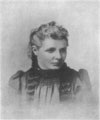
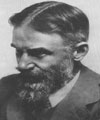
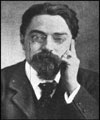
Fabius Cunctator’s strategy which was to guide the Fabians was summarized in Podmore’s words: “For the right moment you must wait; when the time comes you must strike hard.” The Fabians soon attracted intellectuals from various other dissident organizations. Of these, Sidney Webb, Bernard Shaw and Annie Besant were members of the Dialectical Society, influenced by the liberal millenarian aspirations of John Stuart Mill. As of 1886, the Fabian executive committee was comprised of Pease, Podmore, Besant, Shaw and Webb. However in 1889, Annie Besant was converted to the cult of Theosophy by Madame Blavatsky, whom she succeeded in 1891 as president of the Theosophical Society.
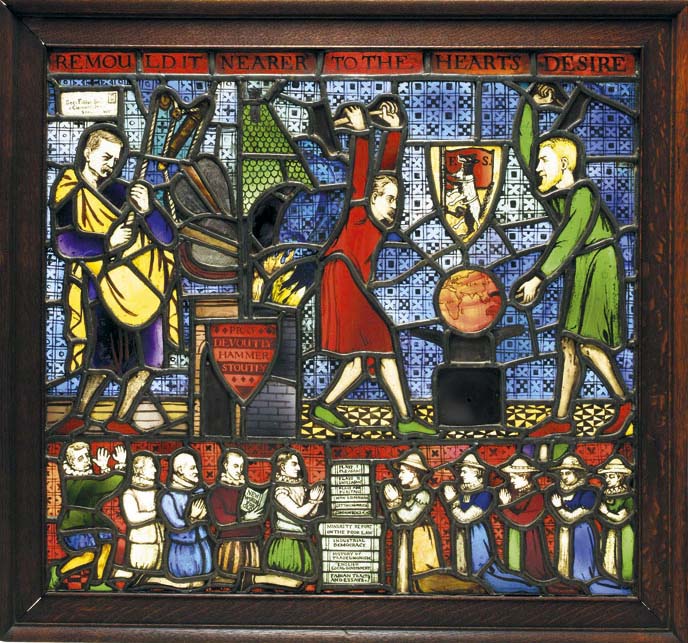
On the Fabian coat of arms between the two men on the right is a wolf dressed in sheep’s clothing. To the right is George Bernard Shaw and to the left is Sydney Webb, each holding a hammer. Shaw is holding the world on an anvil. The caption above proclaims, “We mold it nearer to the heart’s desire.” Below are a group of men kneeling before the books of ancient Greek philosophers, and to the left is H.G. Wells thumbing his nose.
Upon this revolutionary base, Sidney Webb, his wife Beatrice and playwright George Bernard Shaw built an organization which educated the intellectuals, bohemians and disillusioned clergy of England in the art of ‘permeating’ and using the machinery of government for their own socialist ends. As Sidney Webb wrote to Edward Pease in 1886, “Nothing is done in England without the consent of a small intellectual yet political class in London, not 2000 in number. We alone could get at that class.” The MacKenzies observed, “There was, indeed, no clear dividing line between spiritual discontent and political radicalism in the netherworld of dissent.” Bernard Shaw and Sidney Webb argued that “socialism could be proposed without forfeiture of moral credit by a bishop as well as a desperado.” The formation of Christian Socialists and Christian Social Union created the vehicle by which socialist doctrine would permeate the Anglican Church.
…the first Fabians… had almost all been lapsed Anglicans from Evangelical homes. There was a Christian fringe to the London socialism of the eighties, but this too was Anglican. The Christian Socialists came together in Stewart Headlam’s Guild of St. Matthew and the Land Reform Union; and the more respectable Christian Social Union, formed in 1889 - seeking in Fabian style to permeate the Anglican Church - soon attracted more than two thousand clerical members. Dissenting clergymen too began to find a place in the Fabian Society and the London Progressives, while Unitarian churches and centres like Stanton Coit’s Ethical Church provided a meeting place for believers and idealist agnostics….Socialism was for all of them, the new Evangelism.
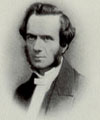 As Bishop of Durham, B.F. Westcott also served as first president of the Christian Social Union. The subject of an address at Manchester in November of 1895 was Christian Law, which Westcott postulated changes to adapt to variable social conditions:
As Bishop of Durham, B.F. Westcott also served as first president of the Christian Social Union. The subject of an address at Manchester in November of 1895 was Christian Law, which Westcott postulated changes to adapt to variable social conditions:
The Christian Law, then is the embodiment of the truth for action, in forms answering to the conditions of society from age to age. The embodiment takes place slowly and can never be complete. It is impossible for us to rest indolently in conclusions of the past. In each generation the obligation is laid on Christians to bring new problems of conduct into the divine light and to find their solution under the teaching of the Spirit.
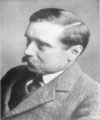
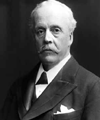
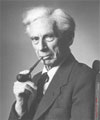
In 1894, the Fabian Society designated a large bequest to found the London School of Economics and Political Science. Philosopher Bertrand Russell served on the Administration Committee while Arthur Balfour contributed and collaborated with Sidney Webb to introduce legislation in Parliament which would give the school university status. H.G. Wells, who had recently joined the Fabians, was “branching out into speculations about a new social order which naturally interested the Webbs.” An elite group of Twelve Wise Men, which included Russell and Wells, were selected as the ‘Co-Efficients’ who met to discuss and formulate “ideas about racial improvement by selecting out the efficient…and Shaw was working on these ’eugenic’ notions in his new play Man and Superman. Beatrice Webb called it ’the most important of all questions, the breeding of the right sort of man’…Above all they were avowed elitists, intolerant of the cumbersome and apparently wasteful processes of democracy, who wanted to see England ruled by a superior caste which matched an enlightened sense of duty with a competence to govern effectively. All of them, moreover, shared Sidney’s belief - which had led him to spend so much effort on London education and on the School of Economics - that social improvement depended upon the training of the superior manpower needed to carry out schemes of reform. Shaw was suggesting in his latest play that universal suffrage was a disaster, putting power in the hands of the ‘riff-raff’ and…Webb who could not wait until a new race of supermen had been bred up to establish the millennium, felt that improved education and intelligent politics would at least start the necessary process of regeneration.”
Established as a long-term investment to educate and train an elite workforce to carry out the schemes of socialist reform, the London School of Economics is now one of the largest schools of the University of London, having also an international reputation. Over half of its 5,000 students and academic staff are from outside of the United Kingdom. Five of its former staff members have won Nobel Prizes and its Journal of International Studies, Millennium, enjoys world-wide circulation and recognition.
The London School of Economics (LSE) also provides consultants to many organizations, including the U.K. government, international bodies such as the World Bank, the International Monetary Fund and the United Nations. The Ford Foundation, which funds and whose members serve as trustees on the Council on Foreign Relations, provided a grant in 1967 to the LSE for a Centre for International Studies. The European Institute of the LSE participates actively in the European Series conferences and hosted the 1996 conference which held discussions on the European Union, European governance and law and Europe in the world economy. The Fabian Society continues today with over 6,000 members.
Related Pages ¶
- The New World Order
- The Council on Foreign Relations
- Bilderberg Group
- Club of Rome
- Trilateral Commission